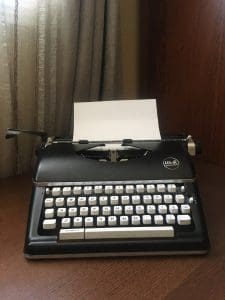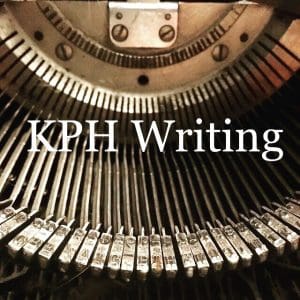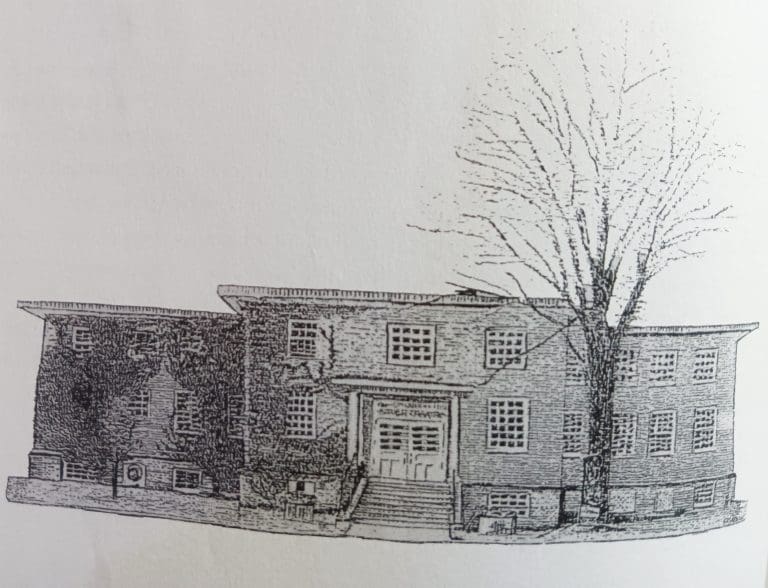Branding: Coordinating My Wardrobe to the HARP Colour Palette
Posted by Dorothy Lander: dorothy@tryhealingarts.ca The talented team at This is Marketing (https://www.thisismarketing.ca/) chose a unique colour palette to illuminate
– by Kyla Heyming, KPH – For Those I Have Loved (HARP, 2020) https://stagingnest.tech/books/for-those-i-have-loved/
My love affair with the typewriter began as most passions do: with a connection, a spark, and an idea.
I have been calling myself a writer ever since I was 14. An idea had crept into my mind and it festered there until the compulsion to write it down grew unbearable. Within three months, I had written my first story and had already started a second. I knew then and there that I wanted to make a living off of writing because, as Gloria Steinman once wrote: “Writing is the only thing that, when I do it, I don’t feel I should be doing something else.” So I kept writing one story after another, as new ideas kept popping into my mind.
Once I completed my university degree and entered into the workforce, I was adamant about trying to reintegrate things that I loved into my life, but that I didn’t get the chance to dedicate much time to while I was studying. One of these things was “reading for fun” as I so often called it because I did plenty of plain old reading for academic purposes when I was studying English Literature. While scrolling through many different social media sites in search of new book recommendations, I stumbled upon a quote that struck a chord with me. It was from German-American writer and poet Charles Bukowski. There was something about his words that resonated with me. I quickly typed up his name in the search bar and pulled up a sea of his sayings. It was as though each and every quote I’d read was a truth I knew about myself, and that was finally being put into words.
After spending one too many hours on the internet, I ran to the nearest bookstore and picked up a few of his titles. I read through the first book quickly. I picked up another and demolished it as quickly as the first. In a week and a half, I had read hundreds of his poems and felt as though I was meeting the other part of myself. After taking the chance to get to know the mind and the heart of the man, I wanted to know a little more about his life. I researched Henry Charles Bukowski and was floored not only by his life but also by the sheer volume of his writing. This was a man who had started writing in his twenties, found a little success, had a breakdown, and started to find himself in his writing later on in his life. He would just write whatever it was that was on his mind using a typewriter. He had found success, as well as crippling defeat, but he remained a resilient person, if not also a little controversial. No matter what he faced in life, all that ever mattered to him was to be able to write; and I felt that to the very core of my being.
Throughout the numerous articles I had perused, as well as facts mentioned in some of his own poetry, Bukowski was a creature of habit when he wrote. He liked drinking. He liked listening to classical music. And he liked to write using a typewriter. This trio seemed to be a formula that many famous writers either tried or adopted (in part or in full) at some point in their careers. I thought I’d give it a shot too. I already liked to listen to music whenever I’d write, and I’d often have a beverage near me, though not always an alcoholic one. The one thing missing from my holy trinity was the typewriter.
I started my search and was pleasantly surprised when I found one for sale. That same day I went and purchased it, set it up in my room, and spent a good 10 minutes just staring at how gorgeous it looked. Matte black with silver detailing, a dual ribbon for black and colour print, and the smooth sound of the click of the keys. I named it Hank, after the man who inspired me to try this new medium. (In many of his fiction stories, and even in some of his poems, Charles Bukowski talks about an “alter ego” character that goes by the name of Hank Chinaski.)
And just as though a switch had been flipped inside of me, poetry began to pour out of me as I typed every new poem onto Hank. The connection, the flow, the ideas were practically all instantaneous. In just a short month, I had completed my very first collection entitled “The Click of the Keys”, and I was surprised to reread my own words; how honest, raw, and emotional they were. Every instance I had once pushed down or pushed aside, I had resurrected in my poetry to work through them. All of the pent-up emotions were being freed all at once. It was liberating.



This new-found freedom and love of poetry granted to me by my purchase and use of a typewriter was intoxicating. I was writing one poem after another and I showed no signs of stopping either. Using a typewriter combined the sense of connection to my work that I loved from writing stories by hand, and the speed of typing with a keyboard. It was also as though I was paying homage to all of the great writers before me who used the machine and was following in their footsteps. There was something so wonderfully organic about the process of writing on such an industrial machine.
What started off as a whim to emulate the writers I admired has now become a practice I’ve adopted for my own poetry. Each and every one of my poems is typed on the typewriter first, creating a unique collection of one-of-a-kind poems. Afterward, I retype each of my poems onto my computer in order to get them ready for submissions and publishing. This extra little step also motivates me to edit my work and ensure that what I want to say comes across in the words I’ve chosen, and the way I relate it. Using a typewriter may not be the right choice for everyone, but it’s definitely one I’d recommend trying at least once because the click of the keys might leave you in awe of your own writing.
Posted by Dorothy Lander: dorothy@tryhealingarts.ca The talented team at This is Marketing (https://www.thisismarketing.ca/) chose a unique colour palette to illuminate


L to R Clockwise: John Graham-Pole aged 2 on Mummy’s knee with sisters Elizabeth, Mary, and Jane, High Bickington, Devon,


Posted by Dorothy Lander Once a month, John Graham-Pole and I showcase the publications of HARP The People’s Press at


Aboriginal Rock Mural Kimberley Region, Western Australia Posted by John Graham-Pole I don’t have answers to any of these questions,
| Cookie | Duration | Description |
|---|---|---|
| cookielawinfo-checkbox-analytics | 11 months | This cookie is set by GDPR Cookie Consent plugin. The cookie is used to store the user consent for the cookies in the category "Analytics". |
| cookielawinfo-checkbox-functional | 11 months | The cookie is set by GDPR cookie consent to record the user consent for the cookies in the category "Functional". |
| cookielawinfo-checkbox-necessary | 11 months | This cookie is set by GDPR Cookie Consent plugin. The cookies is used to store the user consent for the cookies in the category "Necessary". |
| cookielawinfo-checkbox-others | 11 months | This cookie is set by GDPR Cookie Consent plugin. The cookie is used to store the user consent for the cookies in the category "Other. |
| cookielawinfo-checkbox-performance | 11 months | This cookie is set by GDPR Cookie Consent plugin. The cookie is used to store the user consent for the cookies in the category "Performance". |
| viewed_cookie_policy | 11 months | The cookie is set by the GDPR Cookie Consent plugin and is used to store whether or not user has consented to the use of cookies. It does not store any personal data. |